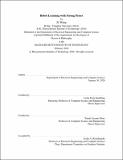Robot learning with strong priors
Author(s)
Wang, Zi,Ph.D.Massachusetts Institute of Technology.
Download1201540985-MIT.pdf (42.81Mb)
Other Contributors
Massachusetts Institute of Technology. Department of Electrical Engineering and Computer Science.
Advisor
Leslie Pack Kaelbling and Tomás Lozano-Pérez.
Terms of use
Metadata
Show full item recordAbstract
Embedding learning ability in robotic systems is one of the long sought-after objectives of artificial intelligence research. Despite the recent advancements in hardware, large-scale machine learning algorithms and theoretical understanding of deep learning, it is still quite unrealistic to deploy an end-to-end learning agent in the wild, attempting to learn everything from scratch. Instead, we identify the importance of imposing strong prior knowledge on capable robotic systems and perform robot learning with strong priors. In this thesis, we exemplify the value of imposing strong priors in robot learning (or machine learning in general) via both practical experiments and theories with mild assumptions. Empirically, by proposing new algorithms and systems, we show that (active) model learning with strong priors on model structures makes it feasible to adopt advanced planners to solve complicated long-horizon robotic manipulation problems that were not possible before. On the other hand, we verify our theories through mathematical analyses of data efficiency for our active data acquisition strategies based on Bayesian optimization and systems combining learning and planning. The new approaches integrate structural prior knowledge with statistical machine learning methods to achieve state-ofthe- art performance on complex long-horizon robot manipulation tasks.
Description
This electronic version was submitted by the student author. The certified thesis is available in the Institute Archives and Special Collections. Thesis: Ph. D., Massachusetts Institute of Technology, Department of Electrical Engineering and Computer Science, 2020 Cataloged from student-submitted PDF of thesis. Via. Includes bibliographical references (pages 211-224).
Date issued
2020Department
Massachusetts Institute of Technology. Department of Electrical Engineering and Computer SciencePublisher
Massachusetts Institute of Technology
Keywords
Electrical Engineering and Computer Science.